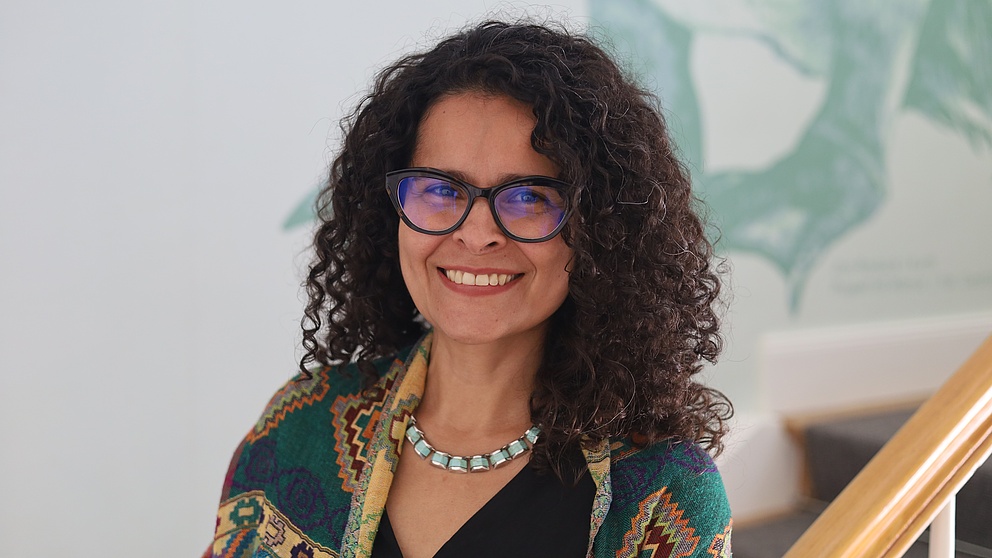

Contact
Press, Communications and Marketing
Tel.: +49 228 833-144
Fax: +49 228 833-441
presse[at]avh.de
María Julia Ochoa Jiménez, a Venezuelan professor of international private law, remembers particularly vividly a case of restitution by the US National Museum of the American Indian, which is part of the Smithsonian Institution, when human remains were returned to their Indigenous communities of origin in Chile. The communities decided not to exhibit the remains publicly but to bury them. Their decision was respected. “Cases like this show what can be done. It is very important to break down the Eurocentric view that has been moulded by colonialism.” This notion shapes Ochoa Jiménez’ work on the restitution of Indigenous cultural objects.
Currently, María Julia Ochoa Jiménez is teaching and doing research at the Universidad Loyola Andalucia in Seville. Until September 2023, the Humboldt Research Fellow was a visiting researcher in Professor Karoline Noack’s team in the Institute for Archaeology and Cultural Anthropology at the University of Bonn. Her project there was to explore cases of international restitution of cultural objects from a Latin American standpoint whilst taking into account the perspectives of experts responsible for a German collection of cultural objects deriving from Indigenous communities in Latin America.
Research location: Germany
“In purely legal terms, restitution is essentially a matter for states to sort out. But the question of whom an object belongs to and who decides what happens to it once it has been returned should not just be considered from a legal point of view,” says Ochoa Jiménez. For her, the anthropological perspective is an important addition where the focus is on cooperation and dialogue with the Indigenous communities of origin on equal terms. “Their own laws and traditions should always be taken into account. And that still happens far too seldom."
She is currently working on the draft of a law on international private law for Colombia which states that the laws and traditions of Indigenous communities of origin must be taken into account when returning Indigenous cultural objects. Should this law be ratified, it could at some future stage amend the existing international law on returning cultural objects, too - for Ochoa Jiménez a protracted and important undertaking on which she also regularly consults with German specialist colleagues.
The lawyer has long been associated with Germany as a research location. In 2011, she completed her doctorate in Göttingen and subsequently spent time working on research at the University of Bonn and the Hamburg-based Max Planck Institute for Comparative and International Private Law. “For me, the German research landscape has always been somewhere I could be free – with regard to the resources available, access to information and international contacts.” She advises Latin American researchers to “go to Germany if you have the chance!”
Fighting poverty
It is important to Ochoa Jiménez to cooperate with researchers in various disciplines. She is a member of Yale University’s Global Justice Programme and active in the international network “Academics Stand Against Poverty.” According to Ochoa Jiménez, Indigenous people around the world are amongst the groups most threatened by poverty. “The fact that their rights are not sufficiently taken into account when returning material cultural objects is partly due to them being poor.” Because poverty was not just a question of money but also the lack of access to education and social participation.
When Ochoa Jiménez looks back on her life, the issues of justice and fighting poverty have been long-term companions. Her mother, Zobeyda Jiménez, a primary school teacher and artist, was active in politics. When she therefore could no longer pursue her original profession, she gave creative courses to people living in poverty. And creativity features in her own professional life, too. “When I had to wait a year to start university, I trained as a goldsmith.” She reaps the benefits of this to this day. “Lawyers have to be able to think creatively if they are to solve the problems of this complex world.”
Difficult conditions
María Julia Ochoa Jiménez left her hometown of Piritu in the Venezuelan federal state of Portuguesa to go to university, hoping to eventually be able to pursue a career in academia. “In 2005, I went to Göttingen to do a doctorate. At the time, the working conditions in Venezuela were still acceptable. When I wanted to return six years later, it was almost impossible to survive as an academic due to the low salaries. Many of those who had taught me at university had already left the country.” In Colombia, where she worked for more than ten years, the working conditions were better.
Something Ochoa Jiménez experienced at every stage of her career: “Even though the conversation about increasing diversity is now taking place nearly everywhere, the reality is often different. As a young female researcher, it can be difficult to gain respect.” And this was combined with other forms of discrimination outside of academia. “In certain circles, a non-white woman from a former Spanish colony is not necessarily welcome.” According to Ochoa Jiménez, in some European countries the process of reappraising their own colonial past is not particularly far advanced. “There is still a lot of work to be done to break down the colonial mindset.” She wants to encourage this. “My work should be a building block that young researchers can use to develop further. In addition to committed and critical minds, social change also takes time.”
Author: Esther Sambale
